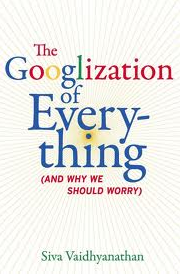All who are fascinated by Google should add “The Googlization of Everything (And Why We Should Worry)” to their reading list. This book by media scholar Siva Vaidhayanathan is an essential companion to Ken Auletta’s “Googled” and “What Would Google Do?” by Jeff Jarvis.
As Vaidhayanathan notes at the outset, his examination is not a rehash of Google’s storied history, which is adequately detailed by Auletta and others. Rather, he proposes a series of questions about Google, its mission and its outsized and growing impact not only on individuals but society. He focuses on Google practices and their impact on privacy, copyright and censorship.
While enthusiastically endorsing much of what Google does and the services it provides — “Google has made my life better and richer” — he encourages readers to go beyond the company’s famous “Don’t be evil” motto to consider the broader implications of the company’s business practices. More than anything, we need to remember that Google exists as a profit-making enterprise beholden to its shareholders. Yes, it provides users with information through its industry-leading search services, but it makes its billions by targeting advertising at those same users.
 As the author notes, Google’s main business is “consumer profiling.” It takes all those searches by users and turns them into leads for advertising to those same users. And for the most part we are content to just go along with it.
As the author notes, Google’s main business is “consumer profiling.” It takes all those searches by users and turns them into leads for advertising to those same users. And for the most part we are content to just go along with it.
Likewise, we seldom hesitate to give over to Google personal data as we make use of all its various platforms, from Google search to Blogger to YouTube to Google Docs. The company processes that data and combines it with everything else it learns about us to further “enhance” all those same services.
This all seems fine as long as the company purports to “don’t be evil.”
The dilemma becomes “How much do we want to control what we do using Google?” vs. “How much are we willing to allow Google to control us?” For example, my Media & Society class has been debating the “filter bubbles” that gradually begin to erode the diversity of our online searches as Google’s sophisticated algorithms offer results more and more in keeping with our interests and opinions.
As Vaidhayanathan notes early on (p. 9): “If Google is the dominant way we navigate the Internet, and thus the primary lens through which we experience both the local and the global, then it has remarkable power to set agendas and alter perceptions. Its biases (valuing popularity over accuracy, established sites over new, and rough rankings over more fluid or multidimensional models of presentation) are built into its algorithms. And those biases affect how we value things, perceive things, and navigate the worlds of culture and ideas.”
The author also explores questions surrounding the Google Books Library Project, an initiative to scan and make available all the world’s books, including works contained in the libraries of universities. While a noble effort in many ways, it runs smack into copyright concerns as well.
Likewise, Vaidhayanathan examines how Google’s products are “customized” from one country to the next — according to local laws and customs, the company notes. Some call it censorship, noting the business incentives that Google has for remaining on good terms in its host countries. The issues raise a variety of interesting free speech and freedom of information questions, which the author notes are constantly in play depending on the political status of each nation.
“The Googlization of Everything” is a thought-provoking read, providing a solid groundwork for evaluating Google both as a force of business and a force for democracy.
-rp-

